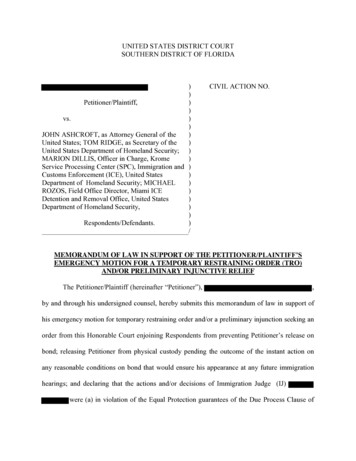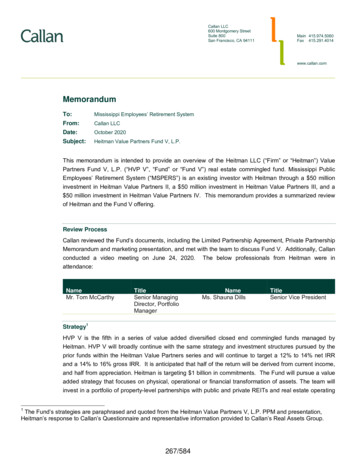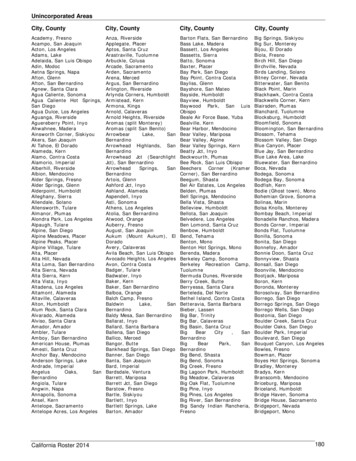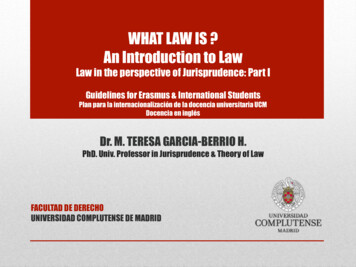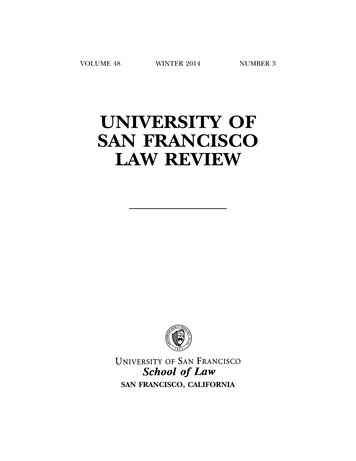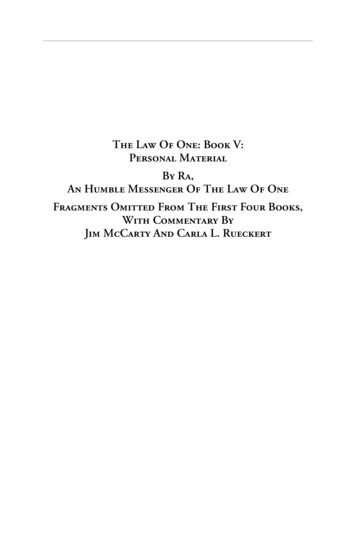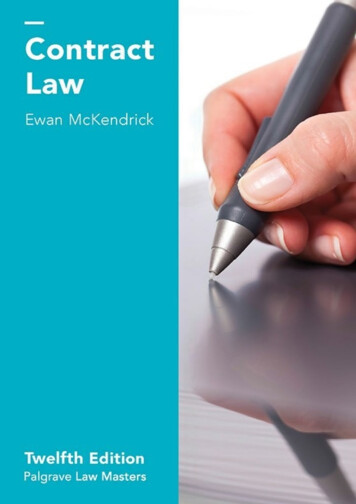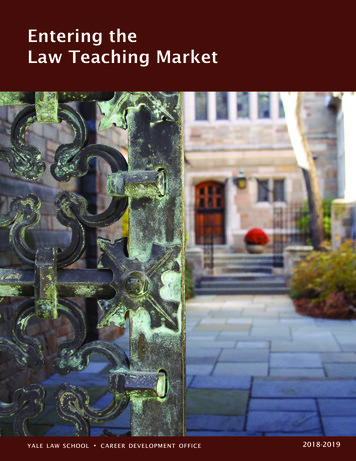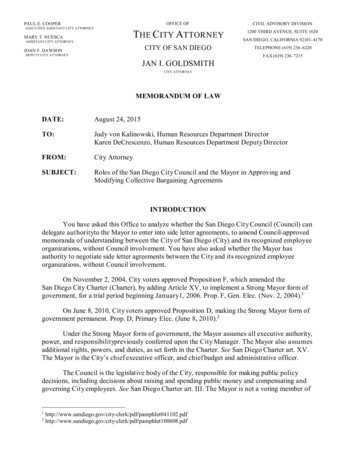
Transcription
OFFICE OFPAUL E. COOPEREXECUTIVE ASSISTANT CITY ATTORNEYMARY T. NUESCATHE CITY ATTORNEYASSISTANT CITY ATTORNEYCITY OF SAN DIEGOJOAN F. DAWSONDEPUTY CITY ATTORNEYCIVIL ADVISORY DIVISION1200 THIRD AVENUE, SUITE 1620SAN DIEGO, CALIFORNIA 92101- 4178TELEPHONE (619) 236- 6220FAX (619) 236- 7215JAN I. GOLDSMITHCITY ATTORNEYMEMORANDUM OF LAWDATE:August 24, 2015TO:Judy von Kalinowski, Human Resources Department DirectorKaren DeCrescenzo, Human Resources Department Deputy DirectorFROM:City AttorneySUBJECT:Roles of the San Diego City Council and the Mayor in Approving andModifying Collective Bargaining AgreementsINTRODUCTIONYou have asked this Office to analyze whether the San Diego City Council (Council) candelegate authorityto the Mayor to enter into side letter agreements, to amend Council-approvedmemoranda of understanding between the City of San Diego (City) and its recognized employeeorganizations, without Council involvement. You have also asked whether the Mayor hasauthority to negotiate side letter agreements between the City and its recognized employeeorganizations, without Council involvement.On November 2, 2004, City voters approved Proposition F, which amended theSan Diego City Charter (Charter), by adding Article XV, to implement a Strong Mayor form ofgovernment, for a trial period beginning January1, 2006. Prop. F, Gen. Elec. (Nov. 2, 2004).1On June 8, 2010, City voters approved Proposition D, making the Strong Mayor form ofgovernment permanent. Prop. D, Primary Elec. (June 8, 2010).2Under the Strong Mayor form of government, the Mayor assumes all executive authority,power, and responsibilitypreviously conferred upon the City Manager. The Mayor also assumesadditional rights, powers, and duties, as set forth in the Charter. See San Diego Charter art. XV.The Mayor is the City s chiefexecutive officer, and chiefbudget and administrative officer.The Council is the legislative body of the City, responsible for making public policydecisions, including decisions about raising and spending public money and compensating andgoverning City employees. See San Diego Charter art. III. The Mayor is not a voting member pamphlet100608.pdf
Judy von KalinowskiKaren DeCrescenzo-2-August 24, 2015the Council, but has veto power over most Council actions, which can be used to force Councilreconsideration of decisions. With sufficient votes, the Council has authority to override amayoral veto. San Diego Charter §§ 280, 285, 290.This Office discussed the role of the Mayor and the Council in impasse resolution relatedto collective bargaining in 2009 City Att y MOL 8 (2009-2; Jan. 26, 2009). As explained in thatmemorandumof law, the Mayor and the Council are both involved in labor negotiations.The collective bargaining process required by Meyers-Milias-Brown Act (MMBA) isprocedural and administrative, in that it requires the City to exchange information and proposalswith its recognized employee organizations in an effort to resolve disputes and reach agreement,prior to modifying wages, hours, or other terms and conditions of employment. Throughthebudget process, the Council has established the Labor Relations Office in the Human ResourcesDepartment (Labor Relations Office), and delegated to its staffthe administrative process ofcollective bargaining. The Labor Relations Office serves as the primary contact for the City s sixrecognized employee organizations on labor issues.3Collective bargaining also involves policy decisions, related to the compensation andbenefits the City pays its employees, and the rules that govern employment, including thequalifications, method of appointment, tenure of office, and removal process. See Cal. Const.art. XI, § 5(a), (b) (stating, generally, that plenary authority is granted to charter cities todetermine the compensation, method of appointment, qualifications, number, tenure of office,and removal process of city employees). These policy decisions are discretionary and legislative,under the authorityof the Council.The specific questions addressed in this Memorandum of Law relate to the use of sideletters to a Council-approved collective bargaining agreement. A side letter agreement is anagreement that is ancillaryto another agreement. See Black s Law Dictionary82 (10th ed. 2014).An agreement is a mutual understanding between two or more persons about their relative rightsand duties regarding past or future performances. Id. at 81.The MMBA does not use the terms side letter agreement or side agreement. See Cal.Gov t Code §§ 3500-3511.4 The MMBA uses the term memorandumof understanding (MOU)to refer to the document that is drafted once tentative agreements are reached in the collective3See v2humanresources.pdf.Courts, in the context of private sector collective bargaining, have described a side agreement or side letteragreement as a collective bargaining agreement that is separate from the underlying or primarycollective bargainingagreement (CBA). See United Steelworkers ofAmerica v. Cooper Tire & Rubber Co., 474 F.3d 271, 274 n.3 (2007).A side letter agreement may be collateral to the primarycollective bargaining agreement, meaning it is set apart anddistinct from it. Cornell University v. UAWLocal 2300, 942 F.2d 138, 140 (1991). Or it may be integrated into theprimaryagreement. Id.4
Judy von KalinowskiKaren DeCrescenzo-3-August 24, 2015bargaining process. Cal. Gov t Code § 3505.1. 5 Memorandumof understanding or MOU isalso the term set forth in the Charter, which provides that the Council approves MOUs.San Diego Charter § 11.2.Under the MMBA, an MOU is between the City, as a public agency employer, and arecognized employee organization, and it sets forththe terms of employment for thoseemployees represented by the recognized employee organization. Valencia v. County ofSonoma,158 Cal. App. 4th 644, 652-53 (2007). As discussed more fully below, the MOU is binding onthe City, including the Mayor and all other officers and employees of the City, once it isapproved by the Council. Id.QUESTIONS PRESENTED1.Can the Council delegate authorityto the Mayor to enter into side letteragreements between the City and its recognized employee organizations, without subsequentCouncil approval, when the side letter agreements amend the terms of an approved MOU?2.Can the Council delegate authorityto the Mayor to enter into side letteragreements between the City and its recognized employee organizations, without subsequentCouncil approval, when the side letter agreements involve administrative issues?SHORT ANSWERS1.Generally no, unless the agreement is necessary to clarify a provision in anapproved MOU or to implement the Council-approved MOU or a Council policy. By definition,an amendment to an approved MOU means a change or revision to the MOU, by addition,deletion, or correction. See Black s Law Dictionary 98 (10th ed. 2014). Under the Charter andstate law, it is the role of the Council, not the Mayor, to approve MOUs, which bind the City, andamending an MOU is also a legislative act, under the purview of the Council. The Mayor s rolein the legislative process is to make recommendations to the Council and to approve or vetolegislative acts, which force Council reconsideration of a decision. The Council can override amayoral veto. If the Mayor desires an amendment to an approved MOU, then the Mayor mustmake the recommendation to the Council, and the Council must determine the parameters of anyrequired collective bargaining and approve any necessary amendments to the approved MOU.However, in his role as the City s chiefexecutive and administrative officer, the Mayor isrequired to implement approved MOUs, and may be required to clarifyan MOU provision. Thisprocess may require further meet and confer with an impacted employee organization on theclarification or implementation. The Mayor or his staffmay memorialize the meet and conferprocess in a side letter agreement, without subsequent Council approval, as long as the terms set5The State Employer-Employee Relations Act (Ralph C. Dills Act or Dills Act) has a provision on side letters,appendices, and other addendum to a ratified memorandum of understanding. Cal. Gov t Code § 3517.63. Itprovides that certain side letters that require the expenditure of 250,000 or more related to salaryand benefits andthat is not alreadycontained in the original MOU or the legislative Budget Act must be presented to the JointLegislative Budget Committee to determine if the side letter presents substantial additions that are not reasonablywithin the parameters of the original memorandum of understanding. Cal. Gov t Code § 3517.63(a). If not, then theside letter must be ratified by the California Legislature. Id. It further provides that the California Department ofHuman Resources must expresslyidentifyif a side letter that does not require expenditure of funds is to beincorporated in a subsequent MOU submitted to the Legislature for approval. Cal. Gov t Code § 3517.63(b).
Judy von KalinowskiKaren DeCrescenzo-4-August 24, 2015forth in the amendment are consistent with and contemplated by the approved MOU. Further, theMayor and his staffmust not infringe upon the Council s nondelegable legislative authoritytoestablish employee compensation and benefit schedules, make decisions regarding theexpenditure of public money, establish the terms and conditions upon which City services areprovided, and set public policy through legislation.2.Yes. The Council may delegate authority to the Mayor to oversee the meet andconfer process and reach binding side letter agreements on administrative issues under thepurview of the Mayor. Further, the Mayor has independent authority under the Charter topromulgate administrative regulations, which may require collective bargaining. The Mayormust administer the mayoral departments, in a manner consistent with any Council-adoptedordinances, resolutions, and policies, including the Council-approved budget and appropriationordinance, employee compensation schedules, Civil Service Rules, and other Council policies.The Mayor also must ensure that the City s obligations to meet and confer are satisfied, and anydispute or impasse regarding a negotiated matter must be submitted to the Council for resolution.DISCUSSIONI.THE CITY IS A PUBLIC AGENCY EMPLOYER THAT MUST COMPLY WITHSTATE-MANDATED COLLECTIVE BARGAINING PROCEDURES.The MMBA, at California Government Code (Government Code) sections 3500through 3511, is the state collective bargaining law applicable to the City as a public agencyemployer. Cal. Gov t Code § 3501(c). See Coachella Valley Mosquito & Vector Control Dist. v.California Public Employment Relations Bd., 35 Cal. 4th 1072, 1077 (2005) (the MMBAgoverns collective bargaining and employer-employee relations for most California local publicentities, including cities, counties, and special districts); People ex rel. Seal Beach PoliceOfficers Ass n v. City ofSeal Beach, 36 Cal. 3d 591, 601-02 (1984) (the meet and conferrequirements of the MMBA do not conflict with the constitutional power of charter cities topropose charter amendments); Los Angeles County Civil Serv. Comm n v. Superior Court,23 Cal. 3d 55, 59 (1978) (holding that requiring charter countyto meet and confer with employeeorganizations before amending its civil service rules does not offend home rule provisions ofCalifornia Constitution).The MMBA provides state law rights to municipal employees, including employees ofthis City. See County Sanitation District No. 2 v. Los Angeles County Employees Ass n, Local660, 38 Cal. 3d 564, 571-72 (1985). The MMBA protects the right of City employees to form,join, and participate in the activities of employee organizations . . . for the purpose ofrepresentation on all matters of employer-employee relations. Cal. Gov t Code § 3502. SeeCounty Sanitation District No. 2, 38 Cal. 3d at 571-72. The MMBA is intended to promoteimproved personnel relations by providing a uniform basis for recognizing the right of publicemployees to join organizations of their own choice. County Sanitation District No. 2, 38 Cal.3d at 572 (quoting Government Code section 3500).
Judy von KalinowskiKaren DeCrescenzo-5-August 24, 2015The MMBA mandates the process that the City must follow to resolve disputes betweenthe City and its recognized employee organizations regarding terms and conditions ofemployment and employer-employee relations. Cal. Gov t Code §§ 3500(a), 3504, 3504.5, 3505,3505.1. See also County Sanitation District No. 2, 38 Cal. 3d at 572. The MMBA requires theCity, through its governing body or properly designated representatives, to meet and confer ingood faith regarding wages, hours, and other terms and conditions of employment withrepresentatives of the City s recognized employee organizations prior to arriving at adetermination of policy or course of action. Cal. Gov t Code §§ 3504, 3504.5, 3505, 3505.1.Under the MMBA, meet and confer in good faith means that the representatives of apublic agency and the representatives of a recognized employee organization must meet promptly upon request by either party and continue for a reasonable period of time in order toexchange freely information, opinions, and proposals and endeavor to reach agreement onmattes within the scope of representation prior to the adoption by the public agency of its finalbudget for the ensuing year. Cal. Gov t Code § 3505.The City must bargain with its recognized employee organizations with the objective ofreaching binding agreements . . . over the relevant terms and conditions of employment. IndioPolice Command Unit Ass n v. City ofIndio, 230 Cal. App. 4th 521, 536 (2014) (internalquotations and citations omitted). If agreements are not reached in the meet and confer process,the MMBA mandates specific impasse procedures, including factfinding when requested by arecognized employee organization. Cal. Gov t Code §§ 3505.2, 3505.4, 3505.5, 3505.7.The MMBA defines mandatory subjects of bargaining, to include all matters relating toemployment conditions and employer-employee relations, including, but not limited to, wages,hours, and other terms and conditions of employment. Cal. Gov t Code § 3504. Collectivebargaining is required when a proposed action or policy has a significant effect on the wages,hours, or working conditions of bargaining unit employees. Building Material & ConstructionTeamsters Union, Local 216 v. Farrell, 41 Cal. 3d 651, 659 (1986).The scope of collective bargaining does not include consideration of the merits,necessity, or organization of any service or activity provided by law or executive order. Cal.Gov t Code § 3504. While the City generally does not have a duty to meet and confer prior tofundamental managerial or policy decisions, it may have a duty to meet and confer on theimpacts or effects of the managerial or policy decision prior to implementation. See ClaremontPolice Officers Ass n v. City ofClaremont, 39 Cal. 4th 623, 632-34, 638 (2006) (stating threepart test a court will apply to determine whether there is a duty to meet and confer onimplementation of a fundamental managerial or policy decision).Government Code section 3507 allows a public agency to adopt reasonable rules andregulations after consultation in good faith with representatives of a recognized employeeorganization or organizations for the administration of employer-employee relations. Cal. Gov tCode § 3507(a). The Council has adopted Council Policy 300-06 as the City sEmployee-Employer Relations Policy, to implement the MMBA. Council Policy 300-06(amended by San Diego Resolution R-301042 (Nov. 14, 2005) (Council Policy 300-06)).Council Policy 300-06 describes matters of general legislative or managerial policy to include:
Judy von KalinowskiKaren DeCrescenzo-6-August 24, 2015The exclusive right to determine the mission of [the City s]constituent departments, commissions and boards; set standards ofservice; determine the procedures and standards of selection foremployment; direct its employees, take disciplinary action; relieveits employees fromduty because of lack of work or for otherlawful reasons; maintain the efficiency of governmentaloperations; determine the methods, means and personnel by whichgovernment operations are to be conducted; take all necessaryactions to carry out its mission in emergencies; and completecontrol and discretion over its organization and the technologyofperforming its work.Council Policy 300-06, § I.A.These management rights are enumerated in the City s MOU with each of its six recognizedemployee organizations. 6While the MMBA establishes the procedures the City must follow in the collectivebargaining process and defines what matters are subject to collective bargaining, the MMBAdoes not dictate the policies or positions the City must pursue in bargaining. Voters forResponsible Retirement v. Board ofSupervisors, 8 Cal. 4th 765, 781 (1994). The CaliforniaSupreme Court has recognized the distinction between the substance of a public employee laborissue and the procedure by which it is resolved. Id. (quoting People ex rel. Seal Beach PoliceOffices Ass n, 36 Cal. 3d at 600-01, n.11). Therefore, the decisions of what compensation andbenefits to offer City employees and what local rules will govern the employment relationshipare generally within the discretion of the City. See Cal. Const. art. XI, § 5(a), (b). The questionspresented here relate to who has the authority in the meet and confer process to make thesepolicy decisions for the City. To answer these questions, we must look to the Charter as well asstate law.II.UNDER THE MMBA, THE COUNCIL, AS THE CITY S GOVERNING BODY,SETS BARGAINING PARAMETERS AND APPROVES AGREEMENTS.7Under the MMBA, the duty to engage in meet and confer rests with the governing bodyof a public agency, or such boards, commissions, administrative officers or other representativesas may be properlydesignated by law or by such governing body. Cal. Gov t Code § 3505. The6See Art. 11, MOU with American Federation of State, Countyand Municipal Employees Ass n, Local 127,San Diego Resolution R-308480 (Oct. 15, 2013); Art. 30, MOU with California Teamsters Local 911, San DiegoResolution R-308479 (Oct. 15, 2013); Art. 10, MOU with the Deputy City Attorneys Association, San DiegoResolution R-308477 (Oct. 15, 2013); Art. 16, MOU with San Diego City Firefighters, International Ass n ofFirefighters, Local 145, San Diego Resolution R-308478 (Oct. 15, 2013); Art. 31, MOU with San Diego MunicipalEmployees Ass n, San Diego Resolution R-308481 (Oct. 15, 2013) (MEA MOU); Art. 9, MOU with San DiegoPolice Officers Ass n, San Diego Resolution R-309613 (Apr. 22, 2015).7Note, to the extentthat the conclusions in this Memorandum of Law differ from the conclusions set forth in 2008City Att y MOL 167 (2008-18; Sept. 18, 2008) (ML-2008-18), regarding the role of the Mayor and the Council inlabor negotiations, this Memorandum of Law supersedes the legal analysis and conclusions in ML-2008-18. Theearlier Memorandum of Law did not address the Charter provisions or controlling California law on the principles oflegislative and executive or administrative authority, or California law interpreting the MMBA.
Judy von KalinowskiKaren DeCrescenzo-7-August 24, 2015Council is the governing body of the City, within the meaning of Government Code section3505, and the Mayor is an administrative officer. See San Diego Charter §§ 11, 11.1, 11.2, 12(the Council is the legislative body of the City). See also San Diego Charter §§ 28, 260, 265. Adesignation by law, within the meaning of Government Code section 3505, is in accordancewith the Charter or any applicable state or federal law, because any designation by the Council,as the City s governing body, must be consistent with the Charter and controlling state andfederal law. Domar Electric, Inc. v. City ofLos Angeles, 9 Cal. 4th 161, 171 (1994) (stating thatthe Council cannot act in violation of the Charter).The Council, by formal action, regularly designates the City s representatives for labornegotiations. See, e.g., San Diego Resolution R-309568 (Mar. 27, 2015). This designation iscontemplated in Council Policy 300-06, which states that the City s management team, uponcompletion of the meet and confer process, prepares and signs the memorandum ofunderstanding, and presents it to the Council for approval, or to the Civil Service Commissionwhen it involves a matter under the authorityof the Civil Service Commission. CouncilPolicy 300-06, § VIII.The Council s designated management team includes the City s ChiefOperating Officerand members of his staff, the City s ChiefFinancial Officer, the Human Resources DepartmentDirector and her staff, among others. This designation is not a delegation of legislative authority.The designated representatives serve as agents of the Council, as the policy maker in thecollective bargaining process, and the Mayor, as the City s chiefexecutive and administrator.8As explained more fully below, the Mayor and his staffmake recommendations to the Councilregarding terms and conditions of employment for represented employees, but the decision toapprove a negotiated agreement is a legislative decision, for the Council to make.9The MMBA requires the governing body of a public agency or its designatedrepresentatives to give reasonable written notice to each recognized employee organizationaffected of any ordinance, rule, resolution, or regulation directly relating to matters within thescope of representation proposed to be adopted by the governing body or the designated boardsand commissions and the opportunity to meet. Cal. Gov t Code § 3504.5. The process ofproviding notice and opportunityto negotiate is procedural and administrative, in that it involvesexchanging information, opinions, and proposals. See 2009 City Att y MOL 8. The CaliforniaAttorney General has described the administrative functions of a local agency s bargaining team:8By resolution, the Council authorizes the representatives to participate in meet and confer, takingCouncil-approved bargaining positions; to execute any tentative agreements and memoranda ofunderstandingreached in meet and confer; and to present all tentative agreements and memoranda of understanding reached inmeet and confer to the Council for final determination and approval by the Council as to policy and the CityAttorneyas to form or correctness. San Diego Resolution R-309568 (Mar. 27, 2015).9Under the Charter, the Civil Service Commission also advises the Council on employment conditions. Chartersection 118 requires the Civil Service Commission to recommend to the Council all rules and amendments related tothe government, supervision and control of the classified service. The Charter requires a noticed, public hearingbefore Council adoption, by ordinance, of any Civil Service rule or amendment. San Diego Charter § 118.
Judy von KalinowskiKaren DeCrescenzo-8-August 24, 2015Though admittedly it cannot bind the local agency to a laborcontract, its functions are more administrative in nature thanadvisory in nature. It has the duty to negotiate to the point ofattempting to reach and reduce to writing a memorandum ofunderstanding which will be submitted to the legislative body forconsideration and possible adoption.61 Ops. Cal. Atty Gen. 1, 6 (Jan. 4, 1978).The City s management team is responsible for this process.Collective bargaining also involves policy decisions under the purview of the legislativebody. The MMBA requires the City to memorialize agreements with its recognized employeeorganizations in writing and present them to the governing body, which is the Council, fordetermination. Cal. Gov t Code § 3505.1. Once the MOU is approved by the governing body,under the MMBA, the public agency is bound to comply with its terms. Glendale CityEmployees Ass n, Inc. v. City ofGlendale, 15 Cal. 3d 328, 332, 335 (1975); City ofLos Angelesv. Superior Court, 56 Cal. 4th 1086, 1092-93 (2013).The California Supreme Court has described Government Code section 3505.1 as a reservation of rights to the governing body to approve or disapprove any agreement emergingfromthe meet and confer process. Voters for Responsible Retirement v. Board ofSupervisors, 8Cal. 4th 765, 783 (1994). See also Long Beach City Employees Ass n, Inc. v. City ofLong Beach,73 Cal. App. 3d 273, 277-78 (1977) (MOU signed by city manager, but rejected by city councilis not binding and city council did not act in bad faith in rejecting MOU); City & County ofSanFrancisco v. Cooper, 13 Cal. 3d 898, 926-27 (1975) (stating that, under the Winton Act, thestatutoryscheme for regulation of employee relations in school districts prior to adoption of theEducational Employment Relations Act, a writtenmemorandumof understanding executed bythe meeting and conferring representatives in itselfcreates no legally binding rights against theschool district, until it is approved by a school board).The MMBA, at Government Code section 3505, mandates that the governing body of thepublic agency conduct or supervise the meet and confer process leading up to the agreement toensure the effectiveness of the collective bargaining process. Voters for Responsible Retirement,8 Cal. 4th at 782-83. The MMBA s purpose is to resolve disputes regarding wages, hours, andother terms and conditions of employment between public employers and public employeeorganizations through the negotiation of binding agreements, and the governing body thatapproves the MOU must also oversee negotiations. Id. at 782. The California Supreme Court hasexplained:Why negotiate an agreement ifeither party can disregard itsprovisions? What point would there be in reducing it to writing, ifthe terms of the contract were of no legal consequence? Whysubmit the agreement to the governing body for determination, ifits approval were without significance? What integritywould beleft in government ifgovernment itselfcould attack the integrityofits own agreement? The procedure established by the act would be
Judy von KalinowskiKaren DeCrescenzo-9-August 24, 2015meaningless if the end-product, a labor-management agreementratified by the governing body of the agency, were a document thatwas itselfmeaningless.Glendale City Employees Ass n, Inc., 15 Cal. 3d at 336.Bargaining without proper authority from the principal can be indicative of bad faithbargaining, if the intent is to delay or thwart the bargaining process. See Oakland Unified SchoolDistrict, PERB Dec. No. 326 (1983). To ensure the City is approaching bargaining in good faith,the City s negotiating team must receive bargaining parameters from the Council because thenegotiators must bargain with the intent to reach agreement, and the agreement must be approvedby the Council. The negotiators must also consider the Mayor s support for bargaining proposalsbecause the Mayor has veto authority over a Council decision to approve an MOU, which, ifexercised, forces Council reconsideration of its approval. San Diego Charter §§ 280(a), 285.Further, the Mayor may make proposals and recommendations to the Council. San DiegoCharter § 265(b)(3). Therefore, the City s negotiating team must measure the support of both theCouncil and the Mayor for bargaining proposals. Ultimately, however, approval of an MOU is alegislative act, under the purview of the Council.Further, California courts have made it clear that, after the legislative body approves anMOU, it may not be rewrittenor modified, except through further collective bargaining and withthe approval of the legislative body. In Voters for Responsible Retirement, the CaliforniaSupreme Court held that once approved by a county board of supervisors, voters may not alter acollective bargaining agreement through a referendum. Voters for Responsible Retirement, 8 Cal.4th at 782. Ifthe bargaining process and ultimate ratification of the fruits of this disputeresolution procedure by the governing agency is to have its purpose fulfilled, then the decision ofthe governing body to approve the MOU must be binding and not subject to the uncertainty ofreferendum. Id. The Court said that power to negotiate a collective bargaining agreement andthe power to approve an agreement must rest with a single decision maker so that the bargainingprocess under the MMBA is not undermined. Id.The California Supreme Court analyzed Government Code section 25123(e), which statesthat ordinances adopted by a county board of supervisors that relate to the adoption orimplementation of a memorandum of understanding between a countyand an employeeorganization take effect immediately, ratherthan 30 days fromthe date of final passage, whichprohibits the opportunity for a referendum. Id. at 783. The California Supreme Court concludedthat the Legislature s restriction of the local referendum right for ordinances adopting or
Judy von KalinowskiKaren DeCrescenzo-10-August 24, 2015implementing employer-employee MOUs is wholly consistent with the overall purpose of theMMBA in promoting definitive resolution of labor-management disputes through the collectivebargaining process. Id.10In another example of the binding nature of legislative approval under the state scollective bargaining laws, a California appellate court held that an arbitrator exceeded herauthority when she changed the terms of an MOU after it had been ratified and approved by theCalifornia Legislature, under the Dills Act, which governs collective bargaining between theState of California and its employees.11 Department ofPersonnel Administration v. CaliforniaCorrectional Peace Officers Ass n, 152 Cal. App. 4th 1193 (2007). The appellate court affirmedthe trial court s order to vacate an arbitrator s award on the ground that the arbitrator exceededher p
CITY OF SAN DIEGO JAN I. GOLDSMITH CITY ATTORNEY CIVIL ADVISORY DIVISION 1200 THIRD AVENUE, SUITE 1620 SAN DIEGO, CALIFORNIA 92101-4178 . See Coachella Valley Mosquito & Vector Control Dist. v. California Public Employment Relations Bd., 35 Cal. 4th 1072, 1077 (2005) (the MMBA

